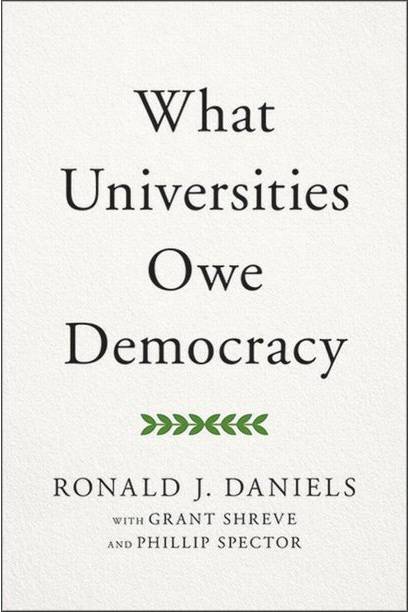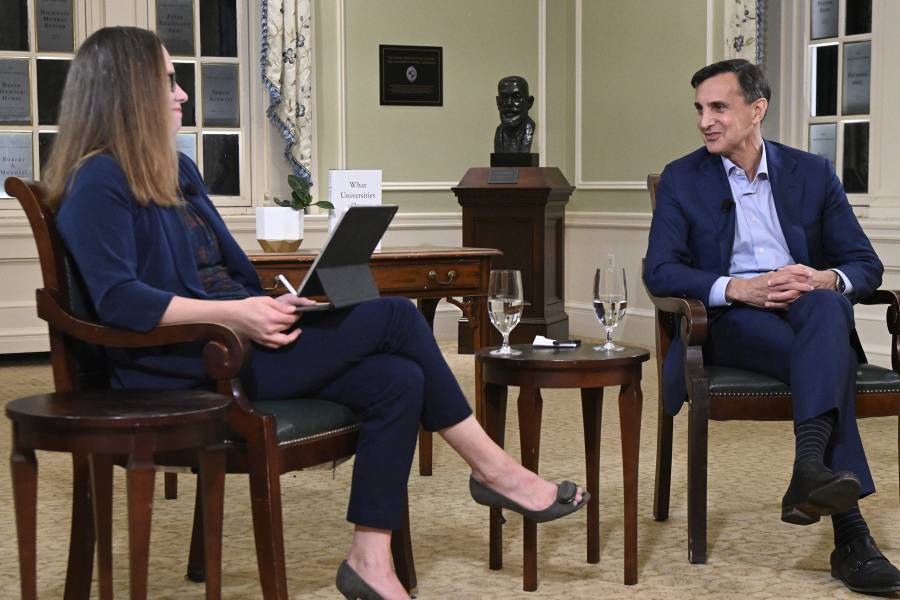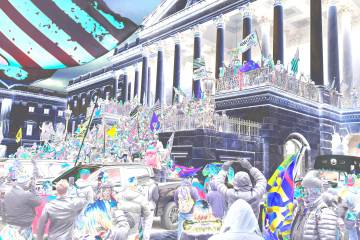We find ourselves at "an all-hands on deck moment for American democracy."
Those are the words of Lilliana Mason, who knows of what she speaks. Mason, who recently joined the faculty at the university's Stavros Niarchos Foundation Agora Institute, is the author of Uncivil Agreement: How Politics Became Our Identity and has devoted her career to studying partisan identity and bias and the polarizing effects of social divisions.
Trusted institutions—government, the courts, the media—and people's faith in those institutions appear increasingly fragile. Legislatures, envisioned as bodies where compromise solutions are forged for the common good, are instead paralyzed by partisan bickering and political gamesmanship. Science and objective truth are under assault, buffeted by disinformation and political interference.
Against that backdrop, Johns Hopkins University President Ronald J. Daniels has authored a book that reminds us that universities, including Hopkins, are also core institutions of democracy and have a critical—even indispensable—role to play if democracies are to continue to flourish. At their best, Daniels writes, universities have the potential to function as engines of social mobility, as educators of citizens, as incubators of truth and expertise, and as places where a diversity of ideas are at once welcomed and challenged, shaping both individual identities and public discourse and policy. It's a hopeful vision, but Daniels also acknowledges in What Universities Owe Democracy, published in October by Johns Hopkins University Press, that universities have to some degree faltered on these fronts.
Daniels and Mason sat together on Nov. 4 to discuss his book and why the fates of universities and American democracy are inexorably intertwined. Below are excerpts of their conversation, edited for brevity and clarity.
Lilliana Mason: This is a critical time for American democracy. We've seen democratic norms and institutions undermined and see them falter. We see an American electorate that is so divided that our legislators are almost prohibited from governing. This really is an all-hands-on-deck moment for American democracy. Why don't we begin with a few words about the book and what inspired you to write it?
Ron Daniels: I think first and foremost, it reflects the moment that we're in right now, in terms of polarization and distrust—distrust of our institutions and distrust of each other—and the kind of gridlock and acrimony that results from that. As stable as we thought our democracy was, it seems less so, and particularly in light of Jan. 6. So, at one level, the polarization of the last several years in this country was an important catalyst for the book. It's also an appreciation of the extent to which, outside of our country, so many countries we felt were certain to become stable democracies now seem fragile, or in fact have slipped back to authoritarianism.
Another dimension is the strong sense that there are a number of bulwark institutions that are implicated in strengthening and preserving our enterprise of flourishing democracy. And as I thought about the institutions that we traditionally associate with democracy—courts, elected legislatures, independent media—the more I realized we actually inhabit an institution that is critical for democracy. It's well understood that universities require strong democracies for universities to be strong, but I thought it was important to ask the question the other way—that is, how do universities contribute to the strength of democracy, and is there more that we can do?
LM: We are so polarized at this point that even the terms "liberal" and "democracy" are embattled terms. You have a specific way of defining both in this book. Can you define what those two terms mean for you?
RD: When we talk about liberal democracy—the particular focus of this book—we are thinking about two different ideas. One is popular sovereignty, and that's typically associated with the idea that we have a majoritarian wealth and we have elected legislatures that are ultimately accountable to the people at large.
The liberal component of this—it's not liberal in a sense that people think about in contemporary discourse, as being associated with a progressive outlook on society—speaks of personal freedom, in the sense that there are limits on what the state can do, even if it is supported through majoritarian will, on the interests and rights of individual citizens.
It's the fusion of these two ideas—of majoritarian will, but also the need to preserve the individual rights, interests, and dignity of the citizens of the state—that gives us liberal democracy. At times, these ideas are in perfect alignment, and there are times that there is grind in the state in terms of how you reconcile those ideas. But fundamentally we know that, as difficult as this enterprise of building and sustaining a liberal democracy is, it's associated with remarkable achievements. Liberal democracies have significant capacity to advance social mobility and economic growth; they are typically more pacific societies.
These are structures of government that do great things for citizenry, and that's why I felt so passionately about the challenges that liberal democracies are facing and how the university can contribute more effectively to its strengthening.

LM: One of the things you talk about in terms of what universities can do to support democracy is increase social mobility, to help people who tend to be marginalized in American society move up and increase their social capital and status. But one of the things that we are seeing as a driver of polarization is that the relative status of different groups of Americans is one of the most inflammatory parts of American democracy, where traditionally high-status groups see other groups getting closer to them in terms of status. That is a threat they feel, and they often respond with antidemocratic reactions. How do we mix this idea of fostering social mobility via the university, while also keeping the status-based conflicts somewhat under control?
RD: It's difficult, and we know, in terms of the level of rancor and the intensity of debate that we've seen around affirmative action and so forth, how incendiary these ideas are. First and foremost, when students—increasingly drawn from diverse backgrounds—come to the university, there are going to be a lot of priors that people bring as to how people got to this place and their entitlement to be there. The university has to make it clear that everyone who has been admitted into the institution, who has membership in it—whether it's a student, faculty member, staff member—they are entitled to be there. Then I think the effort is to find ways to build bridges across those various groups.
At another level, when we think about the issue of access to higher education and the groups that seem to be ascendant and the groups that seem to be threatened by the ascent of other groups, it's important to remind ourselves that when it comes to universities, particularly elite higher education, the university is traditionally a home to students who come from families of extreme privilege. There are about 40 top institutions in the country where you have more students from the top 1% of the socioeconomic distribution than from the bottom 60%. That's a really arresting figure, and it says something important when we talk about who really is at threat from opening up universities—it is a very elite segment of the population. That's important because, to the extent that there are concerns about the new claimants and who is coming into our institutions, we often think about this being about diversity in a sense of race and culture and ethnicity.
LM: You describe a lack of trust from the general public in universities and talk about how the government retreated from supporting higher education in the 1980s, creating this vicious cycle where universities couldn't do as much anymore. Students became more cynical and less trusting of universities, and they got less money from the government, and this cycle continued. I think we're seeing a similar cycle in public investment, public goods, government investing in infrastructure and all these things we've seen crumbling.
There's a theory that one way to increase trust in government is to reinvest in communities and for government to prove that it could be there to help people. Do you think it is the same for universities?
RD: That's an important question, and the issue really bites with public universities in this country, state universities that were very badly battered during the Great Recession. What we saw during that time was that state governments, under intense fiscal pressure, decided to pull back their support of public institutions. As a consequence, those institutions ended up having significant tuition increases and were not able to invest in the kind of financial aid that would mitigate the impact of those increases on students from disadvantaged families. This was devastating, in terms of the accessibility of those institutions. As proud as I am of what we do at Hopkins and our undergraduate experience, it is still small—we have 5,000 undergraduates—compared to the large state institutions that have tens of thousands of students and are very important places where the promise of social mobility is being realized on a great scale. So when those institutions were battered and forced to increase their tuition and function on much less in the way of state resources, I think this couldn't help but denude public trust in those institutions. One hopes that if states were to restore the kind of funding that state institutions enjoyed pre–Great Recession, that would be an important way of demonstrating the importance of this experience that students can get in higher education, which we know changes everything—social status, economic status—and improving people's confidence in state government as well as these institutions.
I will say, I like to think that most of the time politicians are rational actors, and they respond to the people who elect them. And for decades, we have seen a significant disparity between the voting patterns of older vs. younger Americans, with younger Americans not participating nearly to the degree, historically, that older Americans have. In part, this is why it's so important for young Americans to be voting in greater numbers, particularly around issues of investment in education and climate change. But I digress.
LM: There's a difference between how younger people and older people vote. There's also a difference between how people in urban areas and rural areas vote. That is increasingly striking—rural areas are increasingly Republican, whereas urban areas are increasingly Democratic, and that creates not just geographical polarization but an imbalance of political power toward rural areas. It also creates a question for universities that want to attract rural Americans into generally more cosmopolitan environments—these Americans tend to be averse to universities in general, and some are averse to making progress toward a more representative, multiethnic democracy. You said that one way we can attract these students is to find them where they are and offer them opportunities to join these universities. What if they don't want to come?
RD: There's been a lot of interesting work done over the years on the so-called undermatch issue—that there are a lot of students who end up at institutions that are less likely to be as challenging for them, as good for them as they could go to if they were to take advantage of the best institution that's available to them.
Why do people not leave small towns and parts of the country? Maybe it's a taste for that life and they're very comfortable there. But the literature shows that a lot of times it's financial—you may have family members who are dependent on you, or maybe you just cannot afford to leave town to go to an institution that is across the country or across state lines.
Again, I'm not naive enough to believe that every student who could come to an institution like Johns Hopkins necessarily would if you gave them the level of financial aid and support that would make it easy for them. But I believe lots would, and in a country that is increasingly defined by these deep cleavages—and particularly this urban/rural divide—what universities represent is a chance to be cheek by jowl with a broad array of citizens who come from so many different backgrounds. Particularly in a world where we don't have national military service, universities represent that opportunity. Trying to figure out how we get better at building the case for—assuming we get the financial support right—why a student would want to be part of this experience for four years is really important. It's important for them, it's important for us, and it's important for the country.
Something I discuss in the book is what we decided recently to do at Johns Hopkins, to follow the lead of other institutions that have said that students cannot select their roommates coming into first year. We say this is a moment where we're very deliberately going to mix it all up, that we're not going to let students do the thing that would be most logical for them, most natural, in light of where they are coming from, to find someone who is just like them. Rather, we want to be intentional about mixing it up.
With 70% of Americans now graduating from high school and going on to some kind of postsecondary education, if more and more universities were more focused on this kind of bridging exercise, I feel quite hopeful that this could play an important role in getting us out of the morass we're in right now, which is just so mean and so corrosive.
LM: I really want to underscore what you just said—there are two things that we know reduce intolerance and conflict. One is contact with people who are unlike us; the other is common identities. One of the great things about universities is, through this period of time when you're all there together, you create a new identity, and it becomes an identity that everyone can hold onto, regardless of where they came from or who they were before.
RD: I agree, and what's so exciting about the university experience is, at one level, students are coming here and saying, "I didn't really think of myself as this before" while thinking about some particularistic identity that they now have the freedom to interrogate and embrace. There are these moments where students are coming here who just haven't seen enough students who are like them—they get to pursue that with a kind of support and encouragement that they haven't had before. And at the same time, they're part of this broader experience of becoming a Hopkins undergrad, and ultimately a Hopkins graduate, and what it means to be part of something that complements and enriches those particularistic identities and yet is another form of combined identity. I think institutions are the place where this has to happen, and I think this is a good place for these kinds of things to happen.
LM: Would it be possible or desirable to create a required course on democracy for all undergraduate students at Johns Hopkins or to build other core curriculum requirements on civics?
RD: I think that's an interesting and important challenge for us. It's one that I write about in the book. Again, if we take the view that the democratic enterprise is hard and requires certain understandings, habits, commitments on the part of its citizens to be successful, then the next question is, can we just assume by virtue of having grown up in a democracy, that that is sufficient training for that role? The idea of democracy places the citizen at the core of it, so you're not a passive bystander—you are a participant in that enterprise.
Here, we know—and this is, I think, lamentable—that only about 25% of high school students graduating in the United States have received what one would say is a good grounding in civics. So we know a lot of our students are coming to Johns Hopkins, as other institutions, and are not tutored in that. And if you feel, as I do, that these are important skills, knowledge, values to be able to impart, then I think it does fall to us to confront the question of whether we doing an adequate job of educating for this. Over the last several years, in the context of our student orientation, we've had moments when we talk about the importance of academic freedom as a central animating idea of the university. And this year, with the help of the SNF Agora Institute, we had a fabulous program that we called Democracy Day, where we introduced students to some of the current challenges that democracy is facing.
But I don't think that's sufficient, particularly in the context of the discussion that we're having about educating students about the challenges of citizenship in an increasingly complex world. I think coupling an understanding of core democratic institutions and the nature of democratic ideas with a critical evaluation of how well that project has been realized is something we should be doing. If I had my druthers, I'd really hope that every student would leave having exposure to that. Again, I know the idea of mandatory courses or selections from a group of identified courses is not typically how we think about things at Johns Hopkins. But, again, if we go back to this idea that we are in a perilous moment and we have the power to do something to help ameliorate some of the worst excesses of this moment, it seems to me we ought to be doing it.
Posted in Voices+Opinion, Politics+Society
Tagged president ron daniels, snf agora institute, democracy










